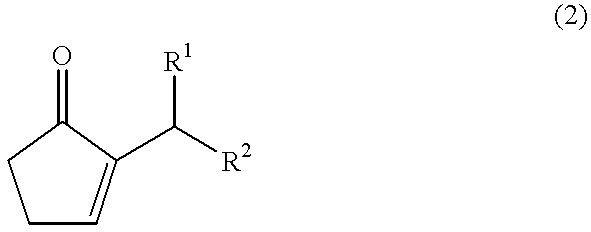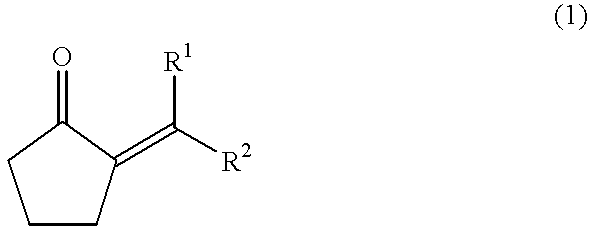Method for producing jasmonate derivatives and intermediates thereof
a technology of jasmonate and derivatives, which is applied in the preparation of carbonyl compounds, organic chemistry, chemistry apparatus and processes, etc., can solve the problems of long reaction time, inability to obtain a high yield, and inability to obtain a sufficiently satisfactory yield
- Summary
- Abstract
- Description
- Claims
- Application Information
AI Technical Summary
Problems solved by technology
Method used
Image
Examples
example 1
19.0 g (0.125 mol) of 2-pentylidene cyclopentanone were dissolved in 19.0 g of n-butanol and heated to 130.degree. C. Then, a mixed solution comprising 1.8 g (0.019 mol) of 3-picoline and 1.3 g (0.013 mol) of a 35% hydrochloric acid was added dropwise thereto for 30 minutes at the same temperature. After this dropping addition was finished, the resultant mixture was stirred for 3.5 hours under heating at the same temperature. After the reaction was finished, the mixture was cooled to the room temperature and neutralized with an aqueous solution of sodium hydroxide. Then, the resultant organic layer was analyzed by a gas chromatography [The analysis was carried out by using a DB-WAX column with tridecane added as the standard substance. Heating condition: from 60 to 220.degree. C. by 5.degree. C. / min]. As the result, it was found that 15.8 g of 2-pentyl-2-cyclopentenone were contained in the product after the reaction was finished (yield: 83.2%).
example 2
15.5 g of 2-pentyl-2-cyclopentenone were obtained (yield: 81.7%) in the same manner as in Example 1 except that a mixed solution comprising 2.3 g (0.025 mol) of 3-picoline and 1.3 g (0.013 mol) of a 35% hydrochloric acid was used.
example 3
15.0 g of 2-pentyl-2-cyclopentenone were obtained (yield: 78.6%) in the same manner as in Example 1 except that a mixed solution of 4.7 g (0.050 mol) of 3-picoline and 1.3 g (0.013 mol) of a 35% hydrochloric acid was used.
PUM
| Property | Measurement | Unit |
|---|---|---|
| molar ratio | aaaaa | aaaaa |
| temperature | aaaaa | aaaaa |
| temperature | aaaaa | aaaaa |
Abstract
Description
Claims
Application Information
 Login to View More
Login to View More - R&D
- Intellectual Property
- Life Sciences
- Materials
- Tech Scout
- Unparalleled Data Quality
- Higher Quality Content
- 60% Fewer Hallucinations
Browse by: Latest US Patents, China's latest patents, Technical Efficacy Thesaurus, Application Domain, Technology Topic, Popular Technical Reports.
© 2025 PatSnap. All rights reserved.Legal|Privacy policy|Modern Slavery Act Transparency Statement|Sitemap|About US| Contact US: help@patsnap.com



